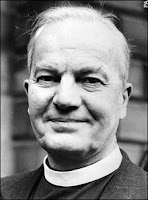Will all be saved?
[Updated 8/27/2019]
But how could a person who is included in God's life (which means that they are accepted, forgiven and loved), reject that life, and thus consign themselves to hell? Again, Torrance cites both human freedom and the irrational nature of evil (the "mystery of iniquity"). As he notes, "to choose our own way [in rejecting God] and yet in that choice still be chosen by God would be hell" (Robinson, p151). Reflecting on this irrational, inexplicable reality of hell, Torrance wonders...
Do Grace Communion Seminary and Grace Communion International (sponsors of this blog) teach a doctrine of universalism? The answer is no---both are in agreement with the teaching on this topic from Trinitarian theologian Thomas F. (TF) Torrance who notes that, "Whether all men will as a matter of fact be saved or not, in the nature of the case, cannot be known" (Scottish Journal of Theology 2 [1949] 310-18, quoted in In the End, God, by John A.T. Robinson, Wipf and Stock: 2011, p. 148). Torrance offers two reasons for this assertion: 1) The irrational mystery of evil. 2) The truth that God gives each person the freedom to say "no" to him---potentially forever. Both reasons must be seen in the light of the deeper truth of God's election, which, in Torrance's view
expresses the universal action of God's grace in such a way that, far from dissolving the personal elements of choice and decision, it establishes them. Election means nothing more and nothing less than the complete action of God's eternal love, that "God so loved the world that he gave his only begotten Son that whosoever believeth on him should not perish but have everlasting life." It is the eternal decision of God who will not be without us entering time as grace, choosing us and appropriating us for himself, and who will not let us go. Election is the love of God enacted and inserted into history in the life, death, and resurrection of Jesus Christ, so that in the strictest sense Jesus Christ is the election of God...
TF Torrance
The great fact of the gospel then is this: that God has actually chosen us in Jesus Christ in spite of our sin, and that in the death of Christ that election has become a fait accompli [accomplished fact]. It means too that God has chosen all men, in as much as Christ died for all men, and because that is once and for all no one can ever elude the election of his love....Every man's being is bound up for ever with the one and indivisible act of God's love in Jesus Christ (Robinson, pp.148-150).This is true for all people - whether they accept their inclusion (election) in Christ, or reject it. Thus people in heaven are included, as are people in hell. What then is the difference? Those in heaven embrace their inclusion, while those in hell reject it.
But how could a person who is included in God's life (which means that they are accepted, forgiven and loved), reject that life, and thus consign themselves to hell? Again, Torrance cites both human freedom and the irrational nature of evil (the "mystery of iniquity"). As he notes, "to choose our own way [in rejecting God] and yet in that choice still be chosen by God would be hell" (Robinson, p151). Reflecting on this irrational, inexplicable reality of hell, Torrance wonders...
Can we imagine anything more appalling than that a man should use the very power that God gives him to choose...should choose to depart from God, and yet be unable to depart, because in spite of all he is still grasped by God in an act of eternal love that will not let him go? The choice by God's love - once and for all enacted in the cross of Jesus - holds that man in being in spite of the fact that he chooses the very contradiction of love and life and being... Love will not let him go. Even when a man has made his bed in hell God's hand of love will continue to grasp him there. To choose finally and forever - unfathomable mystery of iniquity - to say "No" to Jesus is to be held in a hell of one's own choosing and making. It is not God who makes hell, for hell is the contradiction of all that is of God (Robinson, p.151).And so, for Torrance, hell is a real possibility, and that possibility cancels out any doctrine of universalism.
